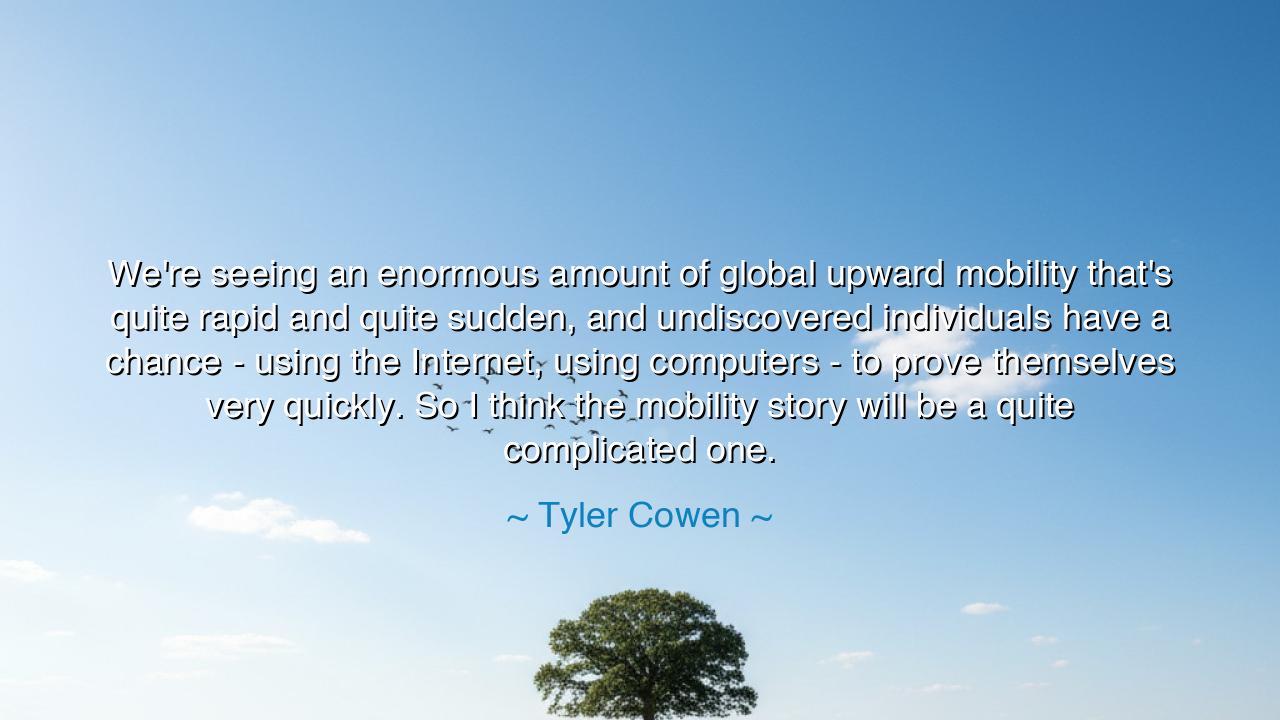
We're seeing an enormous amount of global upward mobility that's
We're seeing an enormous amount of global upward mobility that's quite rapid and quite sudden, and undiscovered individuals have a chance - using the Internet, using computers - to prove themselves very quickly. So I think the mobility story will be a quite complicated one.






"We're seeing an enormous amount of global upward mobility that's quite rapid and quite sudden, and undiscovered individuals have a chance - using the Internet, using computers - to prove themselves very quickly. So I think the mobility story will be a quite complicated one." These words by Tyler Cowen speak to the profound transformation taking place in society and the economy, where technology, particularly the Internet and computers, has become the great equalizer. Cowen points to a world where individuals—previously hidden in the shadows, without access to traditional forms of power or influence—now have an unprecedented opportunity to rise and prove their worth. The path to success no longer depends on birthright, wealth, or connections, but on one's ability to leverage the tools of the modern world to showcase talent, creativity, and drive.
In the ancient world, the notion of mobility was far more rigid. Plato and Aristotle wrote of the ideal state, where individuals were assigned roles based on their birth, virtue, or training. While both philosophers acknowledged the importance of education and virtue for personal growth, the structure of society was one where movement up the social ladder was slow, if not impossible. The common man could only dream of changing his fate, constrained by the limits of his position and circumstances. Cowen’s quote, however, highlights the radical departure from that world: global mobility has become a reality, and individuals—regardless of their background—now have the ability to transcend the boundaries that once confined them.
Consider the story of Socrates, whose influence grew not from his noble birth, but from his ideas and wisdom. Despite being born into relative obscurity, Socrates became one of the most revered figures in philosophy, drawing students from all walks of life to engage in his dialogues. His teachings were revolutionary in their openness to anyone who sought to learn, thus offering a form of intellectual mobility that transcended the rigid structure of Athenian society. Similarly, the Internet today offers a new form of intellectual mobility, where anyone, anywhere, can present their ideas, create, and collaborate—sometimes on a global scale—much like Socrates did in his time, though through different means.
Fast forward to today, and the digital revolution has drastically altered the landscape of global mobility. The rise of social media, online platforms, and freelance opportunities has created a world where undiscovered individuals can rise from obscurity to prominence with startling speed. For example, the success of individuals like Mark Zuckerberg, who created Facebook from his college dorm room, or Elon Musk, who has gone from relatively modest beginnings to becoming a global innovator and entrepreneur, exemplifies how technology has enabled rapid upward mobility. These individuals were not born into dynastic wealth or privilege, but instead, they harnessed the power of technology and vision to create opportunities that propelled them into the global spotlight.
Cowen’s statement also speaks to the complicated nature of this newfound mobility. Success in the digital age is no longer solely about merit, talent, or work ethic. It is also shaped by timing, access to technology, and the social dynamics that are often influenced by algorithms, market trends, and platform popularity. In this sense, while the playing field may seem more level, it is also filled with complexities that were absent in the more traditional world. The question becomes not just whether one has the skill, but whether one has the right exposure and timing to seize the opportunity that technology offers.
In the ancient world, the rise of an individual to power often required connections with the right patrons or being in the right place at the right time, such as Caesar rising to prominence in Roman politics. The same is true in today’s world, but with the added layer of digital influence—where connections, followers, and online presence can propel someone to success just as much as their skill or ideas. The challenge of the digital age, then, is not just about merit; it’s about navigating the complex landscape of the online world, where millions of voices compete for attention and recognition.
The lesson that Cowen’s words impart is that opportunity in the modern age is more accessible than ever, yet it requires a new set of skills to navigate the complexities of global mobility. Technology is an incredible tool, but it is also an unpredictable one. For those seeking to rise, it is crucial to understand not just how to create or perform, but how to navigate the systems of technology and social influence that will allow their voice to be heard. As in ancient times, those who wish to ascend must learn to adapt, not just to the forces around them, but to the opportunities that technology presents.
In practical terms, this means that we must learn to leverage the tools at our disposal—not only for creativity and productivity but also for self-promotion and engagement. Whether through social media, blogging, or networking, the digital age offers an unparalleled opportunity for anyone to share their ideas and skills with the world. At the same time, it is important to approach this new mobility with a sense of responsibility—to ensure that we use our new platforms for the benefit of society, and not merely for self-gain. In doing so, we can help shape a world where creativity, vision, and effort are rewarded, regardless of background, and where true merit can rise to the top.






AAdministratorAdministrator
Welcome, honored guests. Please leave a comment, we will respond soon